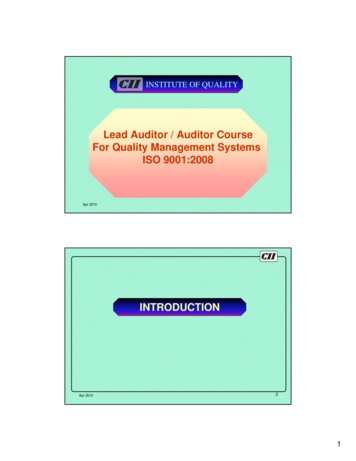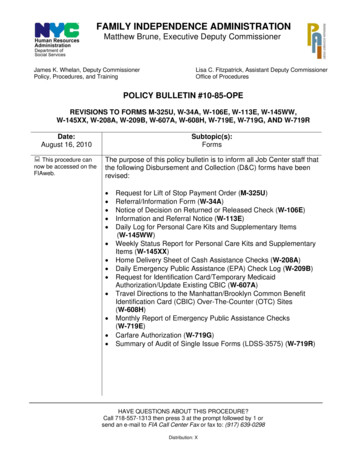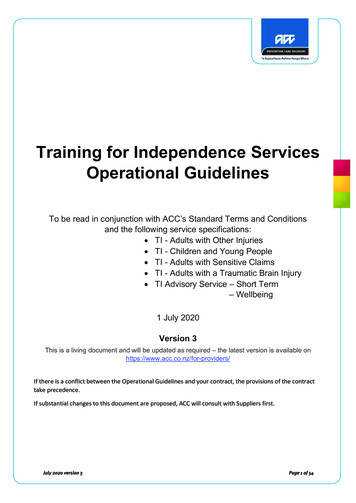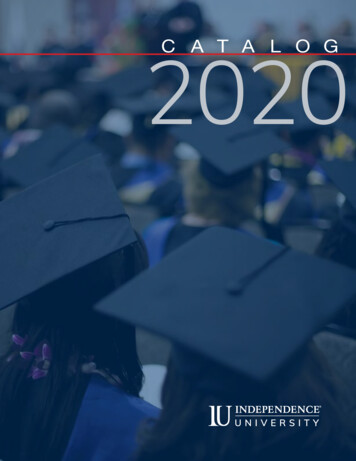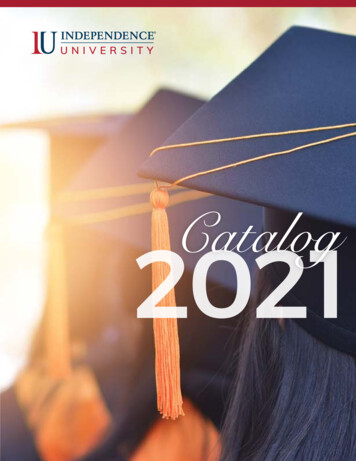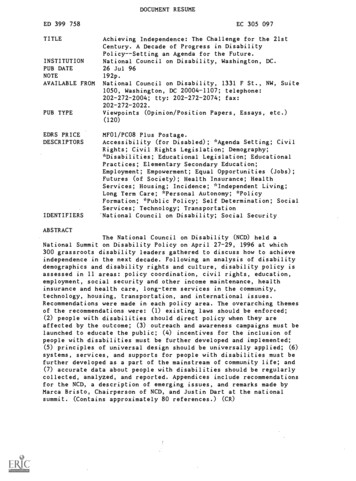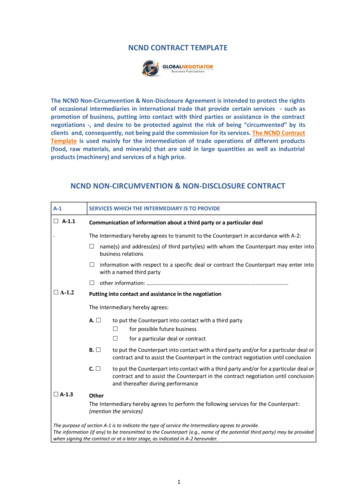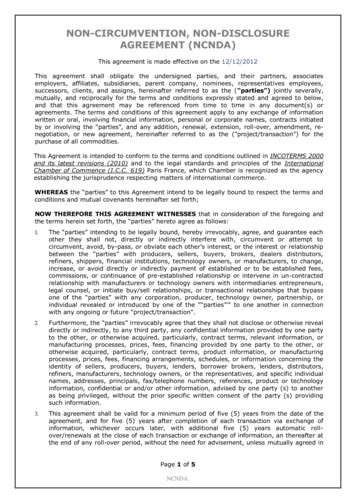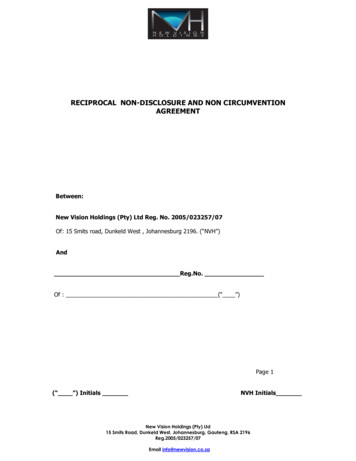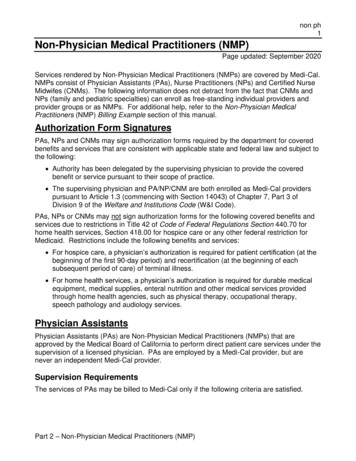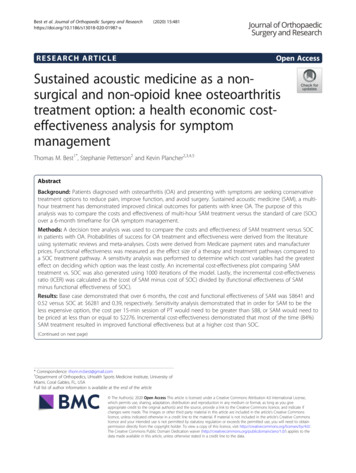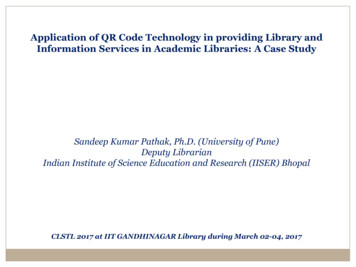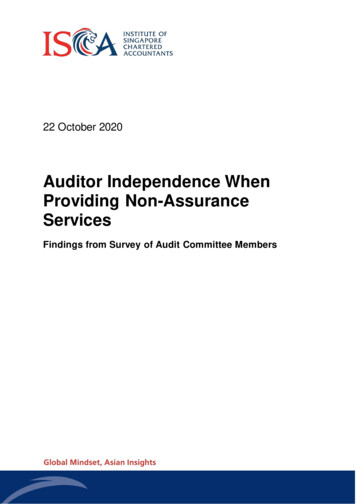
Transcription
22 October 2020Auditor Independence WhenProviding Non-AssuranceServicesFindings from Survey of Audit Committee Members
Page 1About the Institute of Singapore Chartered AccountantsThe Institute of Singapore Chartered Accountants (“ISCA”) is the national accountancy bodyof Singapore. ISCA’s vision is to be a globally recognised professional accountancy body,bringing value to our members, the profession and wider community. There are over 32,000ISCA members making their stride in businesses across industries in Singapore and aroundthe world.Established in 1963, ISCA is an advocate of the interests of the profession. Possessing aGlobal Mindset, with Asian Insights, ISCA leverages its regional expertise, knowledge, andnetworks with diverse stakeholders to contribute towards Singapore’s transformation into aglobal accountancy hub.ISCA is the Designated Entity to confer the Chartered Accountant of Singapore - CA(Singapore) - designation.ISCA is a member of Chartered Accountants Worldwide, a global family that brings togetherthe members of leading institutes to create a community of over 1.8 million CharteredAccountants and students in more than 190 countries.For more information, visit www.isca.org.sg.About ISCA’s Technical DivisionAs the national accountancy body, ISCA is committed in supporting our members in theircareers as they progress and rise to challenges faced along the way. ISCA’s TechnicalDivision provides technical support in areas of audit & assurance, financial reporting,sustainability reporting, ethics and specialised industries such as capital markets, banking andfinance and insurance; and communicates insights and views to our members and the wideraccountancy community. Through our technical committees that comprise representativesfrom various stakeholders in the corporate reporting eco-system, we hear issues from theground and conceive initiatives to promote and enhance quality, consistency and bestpractices to uphold technical excellence.About ISCA’s Ethics CommitteeISCA’s Ethics Committee (“EC”) is chaired by Mr Tan Seng Choon and comprises practitionersfrom accounting firms, members who are professional accountants in businesses, as well asa member from the academic community. ISCA EC also has representatives from theAccounting and Corporate Regulatory Authority (“ACRA”), Monetary Authority of Singapore(“MAS”), Singapore Accountancy Commission (“SAC”) and The Singapore Exchange(“SGX”).ISCA EC takes a leading role in the development of ethics standards in Singapore to enhancepublic trust and confidence in the accounting profession in Singapore. ISCA EC adapts andadopts the International Code of Ethics for Professional Accountants (including InternationalIndependence Standards) issued by the International Ethics Standards Board for Accountants(“IESBA”) for the institute’s use as the ISCA Code of Professional Conduct and Ethics. It alsoaims to provide support to help address ethical issues faced by professional accountants inbusiness and to raise awareness and promoted acceptance of the EC’s ethical standards andguidance among stakeholders.
Page 2AUDITOR INDEPENDENCE WHEN PROVIDINGNON-ASSURANCE SERVICES (“NAS”):FINDINGS FROM SURVEY OF AUDIT COMMITTEE MEMBERSCONTENTSPagesExecutive Summary31Introduction62Method and Respondent Profile83Analyses and Findings94Proposed Revisions to the NAS and Fee-related Provisions of the Code195Conclusion22Appendix 1 - Survey Questionnaire23Appendix 2 - ISCA Comment Letter to IESBA – NAS Exposure Draft30Appendix 3 - ISCA Comment Letter to IESBA – Fees Exposure Draft41Acknowledgements52
Page 3Executive SummaryA. BackgroundThe Institute of Singapore Chartered Accountants Ethics Committee (“ISCA EC”) receivedfeedback indicating diversities in interpretations and practices in applying certain NonAssurance Services (“NAS”) and fee-related provisions in ISCA’s EP 100 Code of ProfessionalConduct and Ethics (“EP 100”). There was also no empirical evidence to ascertain whatinformation is relevant to those charged with governance (“TCWG”) in assessing theindependence of audit firms.To consider inputs across all stakeholders, ISCA EC formed a working group 1 (“ISCA NASWG”) to deep-dive into the local concerns in applying NAS and fee-related provisions in ISCA’sEP 100 and to recommend practices that are relevant and practical to strengthen auditorindependence.B. ISCA Non-Assurance Services Working Group (“NAS WG”)The ISCA NAS WG’s activities include: Performing research to understand and obtain an overview of the relevant NAS and feerelated provisions in United Kingdom and United States;Reaching out to stakeholders to obtain their perspectives about auditor independencerelating to the provision of NAS;Deliberating feedback obtained from stakeholders; andReporting feedback obtained and providing recommendations for ISCA EC’sconsideration.ISCA NAS WG surveyed Audit Committee members in March 2020 to obtain their views onmatters concerning auditor independence when providing NAS to audit clients; and on certainISCA NAS WG’s recommendations to address NAS independence concerns as follows: Confirmation by each network firm 2 on whether the NAS fees earned by the network firmfrom the parent, penultimate parent, ultimate parent and sister entities 3 of the audit clientis less or more than 1% of the network firm’s revenue;Definition of “audit-related services”;Setting a higher threshold to trigger TCWG’s elevated approval on provision of NAS;TCWG’s pre-approval on provision of NAS;Enhanced communication to TCWG and to public on NAS; andAdditional safeguards to address threats to auditors’ independence arising from NAS.1The ISCA NAS WG comprises Mr Tan Seng Choon (Chairman), Mr G. Arull, Associate Prof essorEl’f red Boo, Ms Lorraine Chay Yeow Mei, Ms Caroline Lee, Mr Amos Ng, Ms Ong Bee Yen, Ms SherryQuark, Ms Serene Teo, Ms Andrea Yap and Mr Gerald Yeo.2Network f irm ref ers to a f irm that belongs to a network.3Sister entity ref ers to an entity which is under common control with the audit client.
Page 4C. Key Findings from NAS SurveyWe highlight below key findings from our survey, which address NAS independence concerns:1.Information on NAS Provided by Network Firms to Upstream and Sister Entities isImportant: Majority of the respondents agreed that information on NAS provided bynetwork firms (of the audit firm) to upstream and sister entities is important but it ispractically difficult for an audit firm to obtain such information. More than 90% of therespondents also supported the recommendation for the audit firm to obtain confirmationfrom each network firm, that the NAS fees earned by the network firm from each of theupstream and sister entities of the audit client, do not exceed 1% of the network firm’srevenue.If the amount exceeds 1%, audit firm to apply safeguards by providing to TCWG either aconfirmation from (i) the audit firm that there is no undue influence from network firms onthe audit firm for the execution of audit; or (ii) the audit firm’s ethics and independencepartner (or equivalent) that there is no undue influence from network firms on the auditfirm for its execution of audit.2.Threshold to Trigger TCWG’s Review to Cover Only Controlled Entities: Majority ofthe respondents supported the need to have a threshold to trigger TCWG’s review ofprovision of NAS by the audit firm. More than 80% of the respondents view that thecomputation of such threshold should cover only controlled/downstream entities of theaudited entity. Respondents did not show any strong preference on the formula to be usedfor such threshold.3.No Elevated Approval from TCWG on Provision of NAS: Less than half of therespondents were inclined to have another higher threshold to trigger TCWG’s elevatedapproval on provision of NAS.4.Definition of “Audit-Related Services”: All the respondents agreed with therecommendation to develop a concept of “audit-related services” and that such “auditrelated services” should be excluded from the computation of the proportion of NAS toaudit fee.5.TCWG’s Pre-Approval on Provision of NAS: Close to 70% of the respondents supportthe proposal to obtain pre-approval from TCWG for provision of NAS to the audit client bythe audit firm and its network firms. Out of these 70%, majority agreed that such approvalshould be restricted to the audit client and its unlisted downstream entities. Allrespondents agreed that blanket approval should be applied for NAS that are recurring innature, subject to certain threshold.Please refer to Section 3 for the analyses and findings.
Page 5D. Proposed Revisions to the NAS and Fee-related Provisions of the CodeIn January 2020, the International Ethics Standards Board for Accountants (“IESBA”) issuedtwo exposure drafts (“Eds”) to strengthen the NAS and fee-related independence provisionsof the International Code of Ethics for Professional Accountants (including InternationalIndependence Standards) (“the Code”). Proposed Revisions to the Non-Assurance Services Provisions of the Code (“NAS ED”);andProposed Revisions to the Fee-Related Provisions of the Code (“Fees ED”).Based on the results of the survey, ISCA EC Secretariat put forth certain recommendationswhich garnered strong support from the directors for IESBA’s consideration. For further details,please refer to Section 4.
Page 6Section 1: IntroductionA.Proportion of NAS an Audit Firm Can ProvideThere are existing principles and guidance in both EP 100 (Revised on 14 August 2020) Codeof Professional Conduct and Ethics [“EP 100 (Revised on 14 August 2020)”] and CompaniesRegulations relating to the proportion of NAS that an audit firm can provide as compared tothe audit fees.Paragraph SG410.4A of EP 100 (Revised on 14 August 2020) states:Where an audit client is a listed entity or a public company and the amount of annual feesreceived for non-audit services compared to the total annual audit fees from theaudit client is 50% or more, the firm shall disclose to those charged with governance ofthe audit client the fact that the total of such fees represent 50% or more of total annualaudit fees received by the firm and discuss the safeguards it will apply to reduce the threatto an acceptable level. Examples of safeguards that could be considered and appliedinclude: (a) Independent internal or external quality control reviews of the engagement;and (b) Consulting a third party, such as a professional regulatory body or otherprofessional accountant, on key audit judgements.% NAS fees received from audit client and its related entitiesAudit fees from audit clientThe following is extracted from the Glossary of EP 100 (Revised on 14 August 2020):Audit clientAn entity in respect of which a firm conducts an audit engagement. When the client is alisted entity, audit client will always include its related entities. When the audit client is nota listed entity, audit client includes those related entities over which the client has direct orindirect control.Related entityAn entity that has any of the following relationships with the client:(a) An entity that has direct or indirect control over the client if the client is material tosuch entity;(b) An entity with a direct financial interest in the client if that entity has significantinfluence over the client and the interest in the client is material to such entity;(c) An entity over which the client has direct or indirect control;(d) An entity in which the client, or an entity related to the client under (c) above, has adirect financial interest that gives it significant influence over such entity and theinterest is material to the client and its related entity in (c); and(e) An entity which is under common control with the client (a “sister entity”) if the sisterentity and the client are both material to the entity that controls both the client andsister entity.The current wordings in paragraph SG410.4A of EP 100 (Revised on 14 August 2020) resultedin diversities in interpretations and practices in applying certain NAS and fee-related provisionsin ISCA’s EP 100. There are also misalignments between SG410.4A and Regulation 12 ofCompanies Regulations.
Page 7Regulation 12 of Companies Regulations states:For the purposes of section 206(1A) of the Companies Act, a review of the fees, expensesand emoluments of an auditor of a public company shall be undertaken if the total amountof the fees paid to the auditor for non-audit services in any financial year of thecompany exceeds 50% of the total amount of the fees paid to the auditor in thatfinancial year.% B.NAS fees paid to the auditor (which opine on the financial statements)Total fees paid to the auditorProhibited NASSection 600 of EP 100 (Revised on 14 August 2020) sets out requirements and applicationmaterial relevant to applying the conceptual framework to identify, evaluate and addressthreats to independence when providing NAS to audit clients.Some examples of NAS that are prohibited, regardless of materiality in relation to an auditclient’s financial statements are: Assuming a management responsibility Accounting and bookkeeping services, including preparing financial statements onwhich the firm will express an opinion or financial information which forms the basis ofsuch financial statements 4 Acting as a negotiator on the audit client’s behalf when providing recruiting services tothe audit client Promoting, dealing in, or underwriting the audit client’s shares Serving as General Counsel for legal affairs of an audit clientExamples of NAS that are prohibited, if material in relation to an audit client’s financialstatements are: Valuation services Preparation of current and deferred tax calculations (for an audit client that is a publicinterest entity) Tax planning and other tax advisory services when the effectiveness of the tax advicedepends on a particular accounting treatment or presentation in the financial statementswhich the audit team has reasonable doubt as to its appropriatene
Division provides technical support in areas of audit & assurance, financial reporting, sustainability reporting, ethics and specialised industries such as capital markets, banking and finance and insurance; and communicates insights and views to our members and the wider accountancy community. Through our technical committees that comprise representatives
